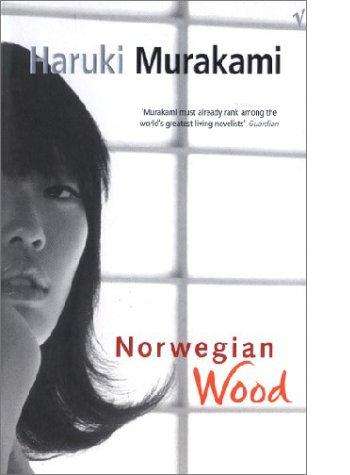Norwegian Wood

Norwegian Wood (Japanese: ノルウェイの森, Noruwei no Mori) is a 1987 Coming of Age novel by the Japanese author Haruki Murakami. The publication of this book led Murakami to unwanted superstardom in Japan; so much so that he eventually left for the United States and Germany. Fans of his works often note that Norwegian Wood as a novel is far removed from his ordinary works. It is a fairly straightforward tale of adolescent romance and the protagonist, Toru Watanabe, is very much an Every Man as opposed to other protagonists in works such as Kafka on the Shore or After Dark.
The plot follows a love triangle among Watanabe, his childhood love Naoko and a girl he meets at university, the outspoken and lively Midori. Each girl represents different things to Watanabe but he has a hard time choosing.
Some critics consider Norwegian Wood to be semi-autobiographical but the author has flat out denied this, describing Norwegian Wood as a "challenge" that he did to see if he could write a novel with none of the themes that have become his trademark in later works.
A film adaptation was made in 2010 by the Vietnamese director Anh Hung Tran. It was released in December 2010 in Japan, as well as festival showings and small releases in Canada and Italy. The cast features Rinko Kikuchi, Kenichi Matsuyama and Shigesato Itoi. The score was composed by Jonny Greenwood.
- All There in the Manual: Kizuki's visit to a hospitalized Naoko via motorcycle is actually elaborated upon in "Blind Willow, Sleeping Woman".
- Author Appeal: Several references to Sixties jazz and pop, The Great Gatsby, The Magic Mountain and various obscure Western Literature works.
- Bastard Boyfriend: Nagasawa to Hatsumi.
- Betty and Veronica: On face value Midori is the more exotic, fun-loving Veronica and Naoko the old, childhood friend Betty, but Murakami plays with this throughout the novel and reader's perspective can be expected to flip.
- Broken Bird: Naoko.
- Chick Magnet: Nagasawa and, to a lesser extent, Watanabe.
- Coming of Age: The novel is a quiet study of this.
- Consummate Liar: Reiko's piano student.
- Cool Big Sis: Reiko Ishida, Naoko's confidant at the centre. Hatsumi also, as a wish fulfillment for Watanabe.
- Naoko's actual older sister was also one of these till she committed suicide and Naoko found her body.
- Driven to Suicide: Sadly, Naoko and Hatsumi. Also Kizuki, whose death provides the catalyst for events in the novel. The reader never gets an inkling towards what caused his suicide, though. There's also Naoko's older sister whose suicide is also left unexplained. The novel seems to run on this trope.
- It's hinted that Kizuki's suicide may have been related to his physical relationship with Naoko.
- Epiphanic Prison: The Ami Hostel, to an extent.
- The Everyman: Watanabe.
- Foil: Nagasawa to Watanabe, despite the former's claims to the contrary.
- Fragile Flower
- The Great Gatsby: Both Watanabe and Nagasawa's favourite novel and a theme of the novel.
- Honey Trap: See the Teens Are Monsters trope below.
- Lipstick Lesbian: Reiko's piano student.
- Love Hurts
- Love Triangle
- Manic Pixie Dream Girl: Midori is this but unusually for the trope Watanabe doesn't realise this until near the end of the novel.
- May-December Romance: Toward the end of the novel.
- Millionaire Playboy: Nagasawa who befriends Toru at their dorm. He also doubles as the Immature Hedonist.
- No Ending: After Naoko's death, Watanabe calls Midori asking whether she'll forgive him and whether they can try again for a relationship. She gives a cryptic response of "Where are you?" and the novel ends with Watanabe trying to answer the question in his inner monologue
- Plucky Girl
- Ordinary University Student: Watanabe.
- The Sixties: The setting.
- Starts with a Suicide: Not the book itself, but the Naoko and Watanabe's story definitely kicks off with Kizuki's suicide.
- Stepford Smiler: Hatsumi, Nagasawa's long-suffering girlfriend. She pretends not to mind that Nagasawa is sleeping around, but two years after Nagasawa graduates and goes abroad, leaving her behind, she marries another man. Two years after the marriage however, she kills herself. Naoko also became this after Kizuki died.
- Teens Are Monsters: The girl who destroyed Reiko Ishida's life. A pathological liar, she tries to seduce Reiko during a piano training session and when the former rebuffs her she lies to her mother that Reiko assaulted her. This is before declaring to Reiko that she had known Reiko was a lesbian as soon as she saw her and implies that the whole thing had been a trap. The lie spreads throughout the neighbourhood and drives Reiko to leave her husband and daughter and go to Ami Hostel in the first place.
- Titled After the Song: After The Beatles song; it's one of Naoko's favorites.
- Uptight Loves Wild: An aversion. Midori's former boyfriend dislikes her approach to life and disapproves of the most minor things. This is even Lampshaded by Watanabe in his inner monologue, wondering why a guy like that would want a girlfriend like Midori.
- Wham! Line: "Reiko wrote me several letters after Naoko's death."